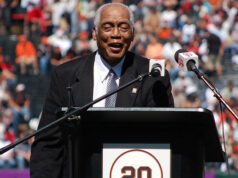by Miguel Humara, Ph.D.
One of my students once asked me why there was so much research in the field of sport psychology on anxiety but very little devoted to depression. She was right, a disproportionate amount of attention has been given to anxiety disorders and eating disorders in the sport psychology literature. After giving it some thought, I have come to the conclusion that this is because of the nature of the problems. While we often hear that athletes do not perform at their expected level because of performance anxiety, you rarely hear that the cause of the problem is depression.
Think about the Superbowl. It is not unusual to hear that players to have a bad case of “nerves” which interferes with their performance. Simply put, they are too up for the game. You never hear that he was too depressed to play like he usually does. Depression is a disorder that typically involves withdrawal, inactivity and feelings of hopelessness and loss of control. This is not at all descriptive of the emotional character of an athlete. As a matter of fact, it would seem that physical activity actually combats each of these symptoms.
While data from the President’s Committee on Mental Health indicates that the rate of depression in American society might be as high as 25%, the rate is substantially lower among individuals who are physically active and regularly participate in athletic activity. In fact, level of fitness has been found to be inversely related to depression. It would seem that participation in physical activity actually protects you from depression.
Athletic Activity As Treatment
Exercise can be as effective as traditional forms of psychotherapy. One study that compared clinically depressed patients seeing a therapist once a week with those involved in a running group five times a week (discussing issues while exercising with little emphasis on the depression itself), found no differences in the improvements experienced by either group.
In most cases I strongly urge that individuals seek the services of an experienced psychologist. However, the benefits of athletic activity in the treatment of depression are clear. Be sure to discuss participation in sports as an adjunct to treatment with your therapist.
So, athletic activity can protect you from developing depression, and it can even help you once you have been diagnosed as clinically depressed. The question remains, why? Two theories may help explain this – Seligman’s Learned Helplessness Model and Beck’s Cognitive Therapy of Depression.
Seligman’s Learned Helplessness Model
Marty Seligman is a psychologist who believed that individuals learn much of their behavior from their experiences in interacting with the world. He proposed the theory that depressed people feel helpless because of efforts that have not resulted in desired outcomes. After this process is repeated over and over, people get to the point that they learn no matter what they do it will result in failure. To use his terminology, they make internal, stable and global attributions. This simply means that the belief that they are at fault for failure and that this will always be the case no matter what the situation.
Sports provides people with a forum to combat this feeling of helplessness. Although they may not always win the game or the race, most athletes experience some degree of success – even if this is only during practice. This is especially true today where organized sports allows for improved competition based on age and achievement level. For example, in most races people are grouped according to age. Many golf competitions take into account an individual’s handicap in order to level the playing field. You can readily how this model accounts for why athletes are rarely depressed.
Beck’s Cognitive Theory Of Depression
Aaron Beck is one of the leading researchers in the field of clinical depression. His work is the basis for much of the treatment that is conducted by psychologists today. According to his theory, depression is caused by dysfunctional automatic thoughts about the self and the world which he calls schema. Schema are models of the self, others and the world that develop throughout the course of life and are used to navigate the environment. According to Beck, depressed individuals process information from the environment such that they only pay attention to that information that confirms their beliefs.
Beck believes that depressive ideation involves what he calls “the cognitive triad.” This triad focuses on negative thoughts about the self, the future and the world. Therefore, physically active people are protected from depression because they have a reference point – their athletic achievements – to develop more positive schema. How does this occur?
- Negative views about the self:Typically, depressed individuals have had repeated experiences which cause them to have low self-esteem or a negative view of themselves. In other words, they have formed a schema in which they feel worthless. Whether it was comments from their parents, teachers, or employers they have simply never had the opportunity for success. Athletes, on the other hand, have many experiences with success. Whether it is in little league baseball, a pick up game of basketball at the gym, or beating their best time in a 1 mile run, they have experienced some success. Even when they have experienced a catastrophic failure, such as Bill Buckner in game 6 of the 1986 World Series, they have developed positive schema which allow them to view their failure as a single isolated event.
- Negative views about the future: Understandably, once negative schema have been developed they have a significant impact on an individual’s ability to be optimistic in the future. Thoughts such as “I’m never going to amount to anything” or “I’ll never be successful” are all too common for the depressed person. Clearly this will have a significant impact on their future performance which just serves to confirms their beliefs. Athletic individuals have a more optimistic outlook. “I lost today but I’ll get him next time” or “So what if I blew that play, I’ve done it a thousand times before and I’ll do it again” are typical thoughts. You can easily see how the schema that are used by these people help to protect them from depression.
- Negative views about the world: Once a person has developed a negative view of themselves and the future, it is next to impossible to have a positive view of the world. Thoughts that the world is an unfair place and that success is something that is controlled by others are not uncommon. Given the nature of their automatic thoughts this is something that is very difficult to control. Athletes have had more positive experiences. Although the referee may be favoring the other team on a particular day, this is not a universally occurring phenomenon. In this situation, their schema would probably cause them to try even harder because of their belief in their control over their own destiny.
Conclusion
The nature of most forms of athletic activity is such that it is not characteristic of depression. While the depressed person is isolated, inactive, and has feelings of hopelessness and loss of control, the athletic environment actively serves to combat each of these. People are forced to get out into the world and participate in something where they are bound to experience success. If you or someone you love is feeling depressed, encourage them to participate in sports as away of combating these feelings. Why not do it anyway just to keep these feelings away altogether?













